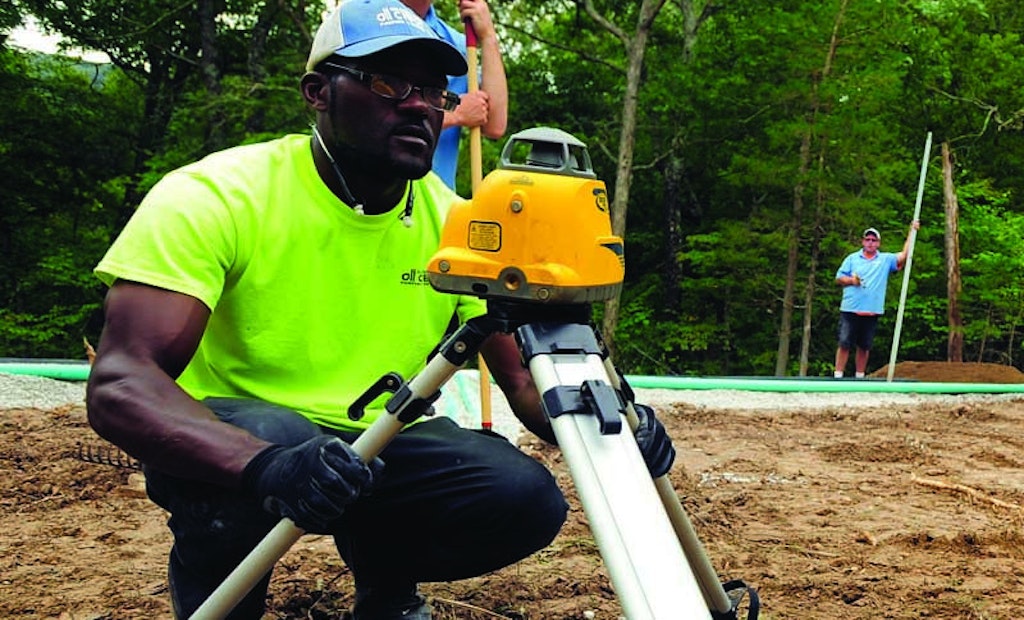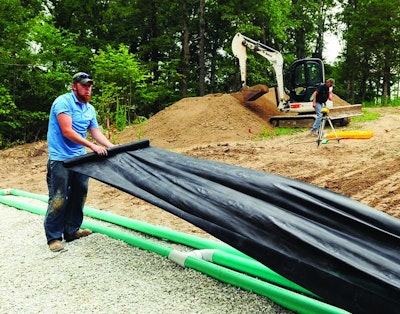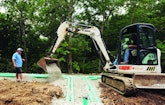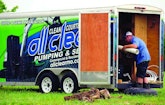
Interested in Excavating?
Get Excavating articles, news and videos right in your inbox! Sign up now.
Excavating + Get AlertsThe funeral and wastewater industries share something in common: They’re both associated with life stresses. Shawn Chilton knows this firsthand because he has managed both a funeral home and his 8-year-old startup installing and pumping business.
“I always say the two worst things that can happen to someone is, one, for one of your loved ones to pass away, and two, to see wastewater flooding your basement,” he says. And a lot of management practices he learned working in the funeral business can help onsite system installers get more organized, according to Chilton.
COMING HOME
When Chilton and his wife, Tracy, were ready to start a family, they also decided to start their own business. They had already spent years in small business, but it was Tracy’s family’s business. This one would be their own, and they chose wastewater.
Since they began it in late 2008, All Clear Pumping & Sewer – based in Jefferson City, Missouri – has grown as fast as children, and for some of the same reasons: careful nurturing and an attention to the little things that make a big difference in the long term.
The Chiltons got their start in small business in Troy, Missouri, about 60 miles northwest of St. Louis. They ran a funeral home. It was one of about a dozen that Tracy’s family owns, but Chilton also worked part time for a pumping company. They wanted to be closer to extended family, so they moved back home to Jefferson City and founded All Clear.
The majority of All Clear’s revenue is in system installation, maintenance and a small but rising number of inspections being requested by mortgage banks. Pumping is also an important business.
MAKE LISTS
In both the funeral and wastewater industries, attention to detail is a key to success.
For a funeral, this means caring for the family and the deceased, personalizing the service in order to provide the best tribute to someone’s life, and having everything go off without a hitch. The solution in the funeral business was a checklist: make sure a member of the clergy is booked, the grave opening and closing are scheduled, the vault will be there, a police escort is arranged, and so on.
“And you have to do it this way because it’s very, very, very important. You can’t just pretend you’re going to remember because you might have multiple funerals at the same time,” Chilton says.
He brought this systematic approach to the wastewater business. Every job has its own folder, and inside that folder is a standard checklist to make sure there’s a signature on a contract, the permit is pulled, the tank is ordered, and so on.
MAKE FRIENDS
Another lesson Chilton brought from his former business is the need for relationships. “In the funeral industry you promote yourself in the community, and I decided I needed to do the same thing for my wastewater business,” he says.
He started with the people who provide him with business and can provide more: real estate agents. To show his appreciation for their business, he rented a bus, rented a suite for a St. Louis Cardinals game, and thought he might attract about 40 people, with his wife, project manager Jason Jones, and other employees filling the remaining seats.
“But it was so popular with the agents we had a waiting list. In Missouri the Cardinals are a big deal, plus everybody likes something free. It’s a two-hour bus ride to St. Louis, and the people could eat and drink for free, and they didn’t have to deal with driving.”
People have asked how he can afford to sponsor such a trip, but Chilton says if he gets a contract to install just one advanced system, the investment will pay for itself.
“This is really nothing more than realizing you have to invest in your business,” he explains. “You have to spend money to make money, and I’m going to do something like this every year. If I spent the same $5,000 on a print advertisement, what do I get out of it? More importantly, what do any potential clients get out of it? This trip makes memories for people.”
Chilton has also taken care to cultivate good relationships with inspectors, and not just to make things run smoothly. Inspectors cannot recommend an installer, he says, but they are allowed to give citizens the names of three companies that provide wastewater services. If the company does a good job, it will be on that list and people will talk.
“When we give people a quality product, at the end of the day they’re going to tell other people. Word-of-mouth is probably the best advertising we have,” says project manager Jones.
CUSTOMER CONFIDENCE
Building and maintaining good relationships with customers is equally important, but this does not mean cutting corners for short-term gain.
“People will say, ‘So-and-so will do this or will do the job for this lesser amount of money.’ I tell them my price is what I need to run my business. I have nine employees, equipment, other costs, and people respect that,” Chilton says.
Another recent addition to the company’s service list is acting as a sort of wastewater general contractor. Under Missouri regulations, customers may obtain their own soil and engineering reports. All Clear offers to hire out these professional services so the customer doesn’t have to. This builds good relationships with other area professionals and can bring All Clear referrals for its business.
“When people see we’ll do this for them, they become comfortable with us and they become comfortable with us putting their system in. And comfort is important because we’re asking people to trust us with a significant investment in their home,” Jones says.
Following installation, All Clear offers a two-year maintenance contract. “That’s something I make sure to talk to people about, especially when we’re considering different products to solve their problem. I give them comparisons of the up-front costs and the long-term costs that include maintenance, and most of the time they are pleased to have this information so they can make better decisions,” Jones says.
In just its first five years, All Clear grew from a few thousand dollars in revenue to more than $1 million. That revenue comes from all those little details he pays attention to, Chilton says.
EQUIPMENT CORNER
Keeping All Clear on the go requires a diverse selection of equipment to handle pumping, installation and home plumbing. The company uses:
- Spartan Tool 798 trailer jetter
- 2001 Peterbilt septic service truck with a 2,500-gallon steel tank and a Jurop/Chandler pump
- 2005 Bobcat 435 that does duty as an excavator or whatever else is needed
- 2015 GMC 3500 pickup to pull the Bobcat
- 2014 Case tractor with a Bradco Vibratory Plow (Paladin Attachments) for installing dripline
- 2012 Nissan cargo van for service calls
- 2011 Ford E250 cargo van for service calls
- 2007 Ford E250 service van
- 2015 GMC 3500 pickup for service calls
They also operate three cameras, two from Spartan Tool and one from RIDGID. They have a Spectra Precision LL300 laser level.
The service vans are smartly covered in full-body wraps. And the septic service truck features a large cabinet situated between the cab and the tank. The cabinet carries a cable machine for clearing residential and other small sewer lines, and there’s a winch to lift the cable machine in and out. The cabinet also has enough room to carry a riser, a lid (Polylok) and other supplies. The purpose is to save time for the whole crew.
“Lake of the Ozarks, where we do some work, is 45 minutes away, and with this system you don’t have to call the guy in the service van to drive half an hour out of his way to handle a sewer cleaning,” Chilton says.
Those wraps are more than pretty. “Those help out a lot. You can’t miss me going down the road, and even though a single wrap is about $3,500, if you get one job because someone noticed you, the wrap is paid for,” Chilton says.
Wraps provide another benefit. When a truck is past its service life, the wrap can be stripped off to reveal a clean, scratch-free truck body underneath – and a clean body means a higher resale value.
GROWTH POTENTIAL
So far All Clear has been mainly working in and around Jefferson City. Chilton has plans to change that and – in the process – rebalance his business. While All Clear is presently split about 60-40 between installing/maintaining/inspecting and pumping, he would prefer a balance of 70-30. “Wastewater systems would produce more revenue for me, and I’d like to have two crews putting in systems simultaneously,” he says.
It will take a lot of advertising in rural areas, but Chilton believes he can find the expansion needed to grow the installing business. There’s another bus trip in his mind, too – not another return to a Cardinals game, although he intends that as well. This other trip will be next fall to Hermann, Missouri, which is known for its Oktoberfest – the German celebration of autumn and harvests, not to mention beer.
It’s another investment and another set of details to attend to, but – as Chilton has already proven – sweating the details now can produce a flood of business later.
Happy employees will perform for customers
Customers aren’t the only people Shawn and Tracy Chilton take care of. They look out for their employees, too. It starts with careful hiring. “We don’t want to hire just anybody. We’re looking for somebody to stay.” Once they join All Clear Pumping & Sewer, people do remain. “And the reason is we pay well. We offer a 401(k). We are a family,” Shawn Chilton says.
“With a lot of guys we hire, we’re starting at the beginning, training them on the basics and building their skills. If you’re going to invest time and money, you want the right candidate,” says project manager Jason Jones.
Chilton says he wanted to offer a health insurance plan, but the cost was too high. He found a different solution: a fixed payment that employees can use as they wish, to buy a policy in the private market or pay toward the premium of a spouse’s plan. “It lets my employees know I care, that I’m not the guy collecting all the money while they get nothing in return for all their hard work.”
“You not only get benefits like the 401(k), but you also get bonuses for going above and beyond,” Jones adds. “Shawn’s whole goal with us is employee retention. What we’re really doing is teaching a skill set to our people, and we want them to stay and gain experience for us.”
Vacation is also an important part of the benefits package, even in the summer when the company is busiest. Chilton provides paid holidays and vacation: one week after a year, two weeks after two years, and three weeks after five years.
His philosophy with employees is simple: “If I can give it, I do. If I can’t give it, I don’t.”












